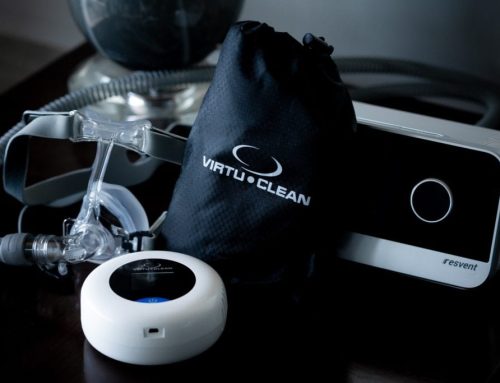Table of Contents
Are Sleep Trackers Giving Users the Wrong Information?
If you suffer from sleep apnea, finding relief can be one of the most liberating feelings in the world. Apnea can be debilitating in extreme cases. Fatigue, mood changes, and health complications can all develop over time. CPAP treatment can provide support during the night, allowing you to rest without pauses in breathing. When combined with a CPAP cleaner, you will have confidence knowing that your equipment is safe and sterile.  Of course, CPAP isn’t the only way that people seek to treat their apnea. Some people seek to improve their therapy and track their conditions by investing in sleep trackers. These small devices have become incredibly popular in recent years, but are they providing the right information? Let’s look at how they work and find out if they’re worth the investment.
Of course, CPAP isn’t the only way that people seek to treat their apnea. Some people seek to improve their therapy and track their conditions by investing in sleep trackers. These small devices have become incredibly popular in recent years, but are they providing the right information? Let’s look at how they work and find out if they’re worth the investment.
How do Sleep Trackers Work?
Sleep trackers are worn on the wrist, just like watches or smart bands. In fact, most trackers are fully-fledged fitness devices that can also track exercise and daily activity. The way that devices track sleep is incredibly simple. Inside the band is an accelerometer that detects the frequency and intensity of movement. Fitbit is one of the most popular fitness trackers used for sleep monitoring. On the company’s website, it is explained that “When your body is completely at rest and unmoving, your Fitbit device records that you are asleep.” The company also explains that on some devices, a heart rate monitor is also used to track the stages of sleep.
Is The Information Accurate?

Here’s where things get tricky. Sleep trackers can detect movement with a high degree of accuracy. Some can also detect heart rate with a moderate degree of accuracy. While these are good indicators that are used in clinical sleep monitoring, they’re not quite enough to paint a full picture. A CPAP cleaner is a small device that sterilizes your mask and tube. It is based on widely recognized science and years of research. Using UV sterilization or Ozone sterilization, a CPAP cleaner can remove pathogens that make you sick. Now, let’s compare that to a sleep tracker, and there are some major concerns.
- Unlike a CPAP cleaner, a sleep tracker doesn’t have years of peer-reviewed science behind the design.
- CPAP cleaning is relatively simple, so sterilization can be achieved using relatively simple technology. Sleep tracking is complicated, so movement is not quite enough to measure sleep duration or quality.
Sleep trackers are only mildly accurate. Movement doesn’t necessarily indicate an episode of apnea. Some trackers may incorrectly report sleep data, which could cause anxiety or lead to poorly informed medical decisions. You can use a sleep tracker as a basic indicator of your sleeping patterns, but that is as good as you will get. For proper sleep analysis, a clinical environment is needed.
What’s Different with Clinical Sleep Tracking

You’ve learned that a sleep tracker looks at movement and sometimes your heart rate. In a real sleep clinic, there’s much more data used to track your sleep. To measure sleep quality and duration, a physician and their support team will perform a polysomnogram. This includes:
- Visual monitoring during sleep to track position and limb movement.
- Measuring breathing, heart rate, blood oxygen, and brain activity.
- Make a professional assessment or diagnosis based on years of training, experience, and scientific data.
If you suspect that your CPAP treatment is not working, then you will need to visit your physician to arrange for a sleep study. You can use a tracker daily and report the information to your doctor, but it will only be used as a rough guideline. Medical professionals make decisions based on real data. Unfortunately, the data that a sleep tracker provides just isn’t good enough.
The Most Effective Ways to Treat Sleep Apnea with CPAP Cleaners and More
With all this information, we can conclude that a sleep tracker should not be used to make major medical decisions. A tracker doesn’t have the accuracy of a real sleep test, and the technology isn’t as proven as other apnea devices like positive airway pressure machines and CPAP cleaners. If you invest in a sleep tracker or fitness band, it’s important to understand the limitations. Always rely on your doctor for real medical analysis.


 Shop
Shop



